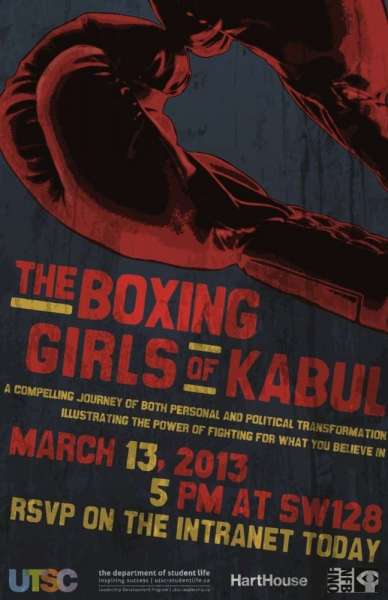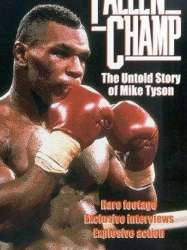The Boxing Girls of Kabul est un film de genre Documentaire
The Boxing Girls of Kabul (2012)

Si vous aimez ce film, faites-le savoir !
- Infos
- Casting
- Infos techniques
- Photos
- Vidéos
- Passages TV
- Citations
- Personnages
- Musique
- Récompenses
Genres Documentaire
Note68%










The Boxing Girls of Kabul is a 2012 Canadian documentary film directed by Ariel Nasr which follows young women boxers and their coach, Sabir Sharifi, at Afghanistan’s female boxing academy, as these athletes face harassment and threats in their efforts to represent their country in international competition and attempt to qualify for the 2012 Olympic Games.
Training takes place at Ghazi Stadium, Afghanistan’s national stadium, which had previously been the site of executions by the Taliban.
The 52-minute documentary was produced by Annette Clarke for the National Film Board of Canada. Julia Kent composed music for the film.
^ Carrington, Julian (23 April 2012). "The Boxing Girls of Kabul". Torontoist. Retrieved 17 January 2013.
^ Cole, Susan G.. "The Boxing Girls of Kabul". Now (magazine). Retrieved 17 January 2013.
^ Vlessing, Etan (30 April 2012). "NFB's 'The Boxing Girls of Kabul' Acquired by In Demand". Hollywood Reporter. Retrieved 17 January 2013.
^ "The Boxing Girls Of Kabul". Hot Docs. Retrieved 17 January 2013.
Commentaires
Postez un commentaire :
Suggestions de films similaires à The Boxing Girls of Kabul
Il y a 8951 ayant les mêmes genres cinématographiques, 6503 films qui ont les mêmes thèmes (dont 8 films qui ont les mêmes 5 thèmes que The Boxing Girls of Kabul), pour avoir au final 70 suggestions de films similaires.Si vous avez aimé The Boxing Girls of Kabul, vous aimerez sûrement les films similaires suivants :

Belarmino (1964)
, 1h20Réalisé par Fernando Lopes
Origine Portugal
Genres Documentaire
Thèmes Sport, Arts martiaux, La boxe, Documentaire sur le sport, Documentaire sur une personnalité
Note75%





Belarmino comprises two strands: an experiential and an interview strand, and constantly alternates between the two. Although these are carefully intertwined on both the sound and image track, they can be separated for ease of discussion.

a.k.a. Cassius Clay (1970)
, 1h19Origine Etats-Unis
Genres Documentaire
Thèmes Sport, Arts martiaux, La boxe, Documentaire sur le sport, Documentaire sur une personnalité
Acteurs Richard Kiley, Stepin Fetchit
Note66%






Shadow Boxers (1999)
, 1h12Origine Etats-Unis
Genres Documentaire
Thèmes Sport, Arts martiaux, La boxe, Documentaire sur le sport, Documentaire sur une personnalité
Acteurs Michael Bentt
Note69%





Bankowsky began working on a film about women's boxing in the early 1990s, when she was training to fight at Gleason's Gym in Brooklyn. Filming commenced at the 1995 Golden Gloves competition, the first year the tournament was open to female participants, a group which included Bankowsky herself. After filming the Golden Gloves, Bankowsky began searching for the woman she thought would be the first truly great female champion. After meeting with Barbara Buttrick, founder of the WIBF, who was in the process of starting a global database of women interested in the sport, Bankowsky came across footage of Rijker and decided she would be the perfect subject for her film.
 , 3h34
, 3h34Réalisé par Ken Burns
Origine Etats-Unis
Genres Documentaire
Thèmes Le racisme, Sport, Arts martiaux, La boxe, Documentaire sur le sport, Documentaire sur la discrimination, Documentaire sur le droit, Documentaire historique, Documentaire sur une personnalité, Le boxe anglaise
Acteurs Keith David, Samuel L. Jackson, Adam Arkin, Philip Bosco, Kevin Conway, Brian Cox
Note82%






Victoire Terminus (2008)
, 1h20Origine France
Genres Documentaire
Thèmes Afrique post-coloniale, Sport, Arts martiaux, La boxe, Documentaire sur le sport, Documentaire sur une personnalité
Note67%





Été 2006 à Kinshasa. Martini, Jeannette, Hélène et Rosette échangent des coups tous les jours avec Coach Judex au vieux stade Tata Raphaël, là où en 1974 Mohamed Ali mit George Foreman KO lors du match le plus légendaire de l’histoire de la boxe. À l’aube, des milliers de personnes du ghetto viennent s’entraîner et organiser des réunions politiques. En échos à la lutte pour le président du Congo (RDC), Judex bataille pour organiser des tournois de boxe féminine avec peu d’argent… Kinshasa chante, Kinshasa a faim et les filles de Judex essaient de survivre, sans trop d’illusion mais toujours avec espoir. Un film sur les femmes dans un pays où les hommes sont devenus fous.

Jack Johnson (1970)
, 1h30Origine Etats-Unis
Genres Documentaire
Thèmes Sport, Arts martiaux, La boxe, Documentaire sur le sport, Documentaire sur une personnalité
Acteurs Brock Peters
Note71%






Tyson (2008)
, 1h30Réalisé par James Toback
Origine Etats-Unis
Genres Drame, Documentaire
Thèmes Sport, Arts martiaux, La boxe, Documentaire sur le sport, Documentaire sur une personnalité
Acteurs Robin Givens, Mills Lane
Note73%





Directeur James Toback prend une inébranlable, regard sans concession sur la vie de Mike Tyson - presque exclusivement du point de vue de l'homme lui-même. Alterne entre le boxeur TYSON controversée face de la caméra et des coups de combats du champion de créer une image saisissante de l'homme.

Réalisé par Barbara Kopple
Origine Etats-Unis
Genres Documentaire
Thèmes Sport, Arts martiaux, La boxe, Documentaire sur le sport, Documentaire sur une personnalité
Acteurs Robin Givens
Note69%






Assault in the Ring (2009)
, 1h23Genres Documentaire
Thèmes Sport, Arts martiaux, La boxe, Documentaire sur le sport, Documentaire sur le droit
Note74%





The documentary examines a boxing match that took place between undefeated prospect Billy Collins Jr. and Luis Resto. The fight was on the undercard for a bout between Roberto Durán and Davey Moore. Resto unexpectedly beat the highly touted Collins in a 10-round unanimous decision; however, after the fight, Resto's gloves are found to be missing a significant amount of padding, an illegal tampering which allowed Resto to inflict greater damage on Collins during the fight. What began as a boxing match turned into a life altering moment for both participants - Collins' career dreams ended and Resto and his trainer Panama Lewis landed in prison for their illegal actions. The subsequent investigation and trial have led many to declare this bout the darkest day in boxing history.

Golden Gloves (1961)
, 27minutesRéalisé par Gilles Groulx
Origine Canada
Genres Documentaire
Thèmes Sport, Arts martiaux, La boxe, Documentaire sur le sport, Documentaire sur les villes
Note77%





 Connexion
Connexion